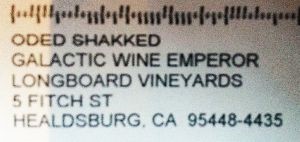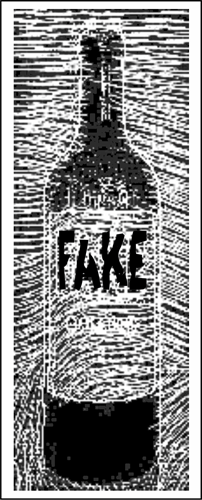Founder, Owner, Winemaker, Hose Dragger, Vine Pruner and amateur blog writer...
Dystopwine Love

I love and hate getting long in the tooth. Love the wisdom and lack of drama I apply to daily situations and the internal peace I managed to acquire over the years while not letting apathy sneak in. Hate the fact that some reference points that still live in my mind are nonexistent to younger folk. Recently, a group of us older fart parents were talking about a youngster that has an extensive collection of sneakers, apparently it is a “thing”. I blurted that I may start calling him “EMELDA” which elicited howls of laughter from my contemporary homies but flew ten miles over the comprehension of the twenty-five years-old’s in the room, probably making them think I’m a bit senile.
As we enter the early stages of a new growing season and a new business cycle, I find similar love/hate moments in my daily interactions with the business side of wine.
The love part is fairly easy. How can you not beam when you look at a row of vines you just finished pruning and realize you did a better job than each of the previous thirty six years. Stuff you had to think about or even (God forbid) have to ask someone for advice about, is now second nature. You can just look at a cane and know if it is the right one to carry the next season’s crop or whether it is one you want to cut and use as merely a replacement spur for the following pruning cycle. A few hours of pruning go by and you realize you did not cut any of your fingers off or even acquired a new scrape… such a delight!
Love is when you get to pull a bottle of wine you made 25 years ago, maybe longer, and you get to sigh in great relief when you manage to pull the cork intact and realize it held up well (and was not tainted..). You let the wine take a few breaths in a quality wine glass while you tear a piece of crusty country bread and bathe it in some aged French triple-cream cheese with a name you have no hope of pronouncing right. The combination is magical and your guests (and you) fall into a deafening silence; you are consumed by the perfect sensory experience and all feels just right with the world.
The hate stuff is not simple and note to self: I need to find a better word to describe the feeling. It boils down to one losing naiveté while gaining experience. What’s to hate about that? It should be very liberating to shed BS and recognize when someone is selling you a wooden nickel, right? Well, easy if you are OK with becoming a gruff, cynical “know it all” kind of a person - not so easy if you realize that change is inevitable and you want to remain engaged and in touch with current reality. Growing up I had choices to ponder like being a doctor, a pilot, a plumber; todays kids may dream of being a social influencer, a video game coder or a Genomic portfolio director, It is a brave new world out there. For me, the choice is clear: I want to stay engaged, I want to be supportive of innovation, but damn… it is hard to not roll your eyes sometimes even if it makes you feel you are the only Neanderthal in the room..
A great indicator to how our daily reality changes is to follow and examine our language and how words are used in daily speech and the media. Here are some wine terms who’s meaning is worth exploring:
Winemaker – A modern term that apparently came from American English. I tried to find where it appeared in writing first but could not get a definitive answer. Merriam Webster website says it came after “Vinter” and then “Vintner”. Interestingly enough, when I worked in France in 1987 I was surprised that the term did not exist in French, Spanish or Italian - you had “Vigneron” a very descriptive term for someone who grows grapes for wine and sometimes actually produces it, and you had “Enologue” who was considered more of a technical expert for all things chemistry in the winery. One of the most hilarious moments during that stint was during a visit to Chateau D’Yquem, hearing from the intern there that the owners showed up one day and saw the enologist, wearing a white lab coat, taking samples from barrels and just went ballistic, screaming that he does not want any scientists in his Chateau. While I refuse to have the title winemaker (my business card says winegrower) I absolutely understand this is a pretty good modern word to describe the position. For me, yeasts are the only true winemakers - I am merely a “vinegar stopper”. However, I start to roll my eyes and unleash my verbal wrath when I read that “Wine-Master” so and so has “carefully selected the lots that make this 2019 Special Reserve Concrete Tub Select Cuvee”. Oh, apologies madam - my mistake, you are a wine MASTER, I had no idea… What kind of a load of crap is that and what kind of person even agrees to have that title on their business card? Did we decide that humility is old fashioned and it is fine to allow public relations and marketing dollars twist our language? How come I am not a wine master? What do I have to do to get the title… I was bothered. I knew I had to be better than that so I agreed to sign up for one of those “free” Beverage Industry Magazines that has articles written by the most boring writers on the planet and that sells their subscribers info to anyone that is willing to pay for a list of potential customers. Sure enough, I got an unsolicited junk mail envelope trying to sell me a set of glasses infused with Dilithium Crystals that are guaranteed to keep a wine fresh for a century or two. Here is the scan of the address label, beat this title suckas!
Semantic Satiation is the process that causes a listener to lose the meaning of a word that is repeated over and over. Two words are currently spewed out on a daily basis in wine social media and in print that are already deep down this path.
The first one is “Sustainable” – What a noble idea, what a great undertaking, hard to believe this buzzword only appeared around 1987. Sustainability tries to address four points: Human, Social, Economic and Environmental and you will struggle to find a winery PR blurb these days that does not mention the winery’s commitment to sustainability. What does it mean in reality? If you believe that a winery owner that made millions exiting a high-tech company and decided to convert pristine hillsides into a vineyard and winery catering to folk with an average income of $650,000 a year while paying minimum wage salaries to employees and avoiding taxes by generating farming losses is a sustainability champion - good for you. Unicorns are real too. I ran into one winery site that described their millionaire owner as a “Steward of the Earth” … really? Am I missing out on something good everyone is smoking? When pressed, one winery executive told me that they are “sustainable and carbon neutral” because they donate every year for trees to be planted in South America to offset their footprint. Like they say: Do as I say, not as I do.
While there are many good people out there trying to do the right thing, many of them with eyes wide open about reality, this circus of sustainability is mainly designed to make you buy wine believing you are saving the planet is no different than a religion that promises you (fill in your favorite after-life benefit…) in return for a cash donation now. In fact, I believe “Green” IS the new religion of the twenty-first century and those stupid “Sustainably Made” stickers on a bottle of wine are the modern equivalent of going to the local Pub for some debauchery after confessing your sins to your priest on a Sunday morning.
The second one is ”Authentic” in all its forms. George Carlin was one of my favorite word researchers, and while he made us laugh by expressing his thoughts in a way that seemed vulgar to some, he also made us think, REALLY think. I remember seeing him perform in the 90’s and even then he was making fun of stuff marketed as “Genuine Imitation Leather”. One look at today’s wine social media pages can easily provide hours of entertainment for your next trans-Atlantic flight. From professionally taken photos of scantly-clad fake blonds gazing at a bottle of wine while soaking in a bubble bath to wines shamelessly proclaiming they are meant for athletes and dieters because they are “sugar free” to new brands custom-produced in a factory from wines purchased on the bulk market promoted with gorgeous photos of vineyard rows saying “OUR” vineyards - everyone claims THEY are authentic and hinting that all others are fake. Some even claim that they are so authentic that they call themselves CULTS (wasn’t this a word reserved for Kool-Aid drinkers not long ago?). My salty, old deck-hand persona says: “If you want to find the most fake wine out there, look for the one that constantly promotes authenticity” and I am reminded of the old consumer wine-tasting truism: “The best wine at the show is at the table with the least decorations.”
And then of course, there are new consumer trends… Let’s have fun with one of them for this session. What in heaven’s name is a Non-Alcoholic Wine? It seems that there is a huge segment of the U.S. wine consuming population that is currently obsessed with alcohol levels and are ready to get behind non-alcoholic cocktails, beer and wine. This is a perfect sign of the times, it basically says: “I can’t trust myself to limit my alcohol and calorie intake, so I’m going to make corporate America do it for me”. Wine is an alcoholic drink made from fermented grape juice. Non-alcohol wine is not wine by definition, just as Music with no sound is not music and like cashew milk cheese is not cheese. And yes, I do have compassion for folk that have medical issues with alcohol. Personally, I think that after a Strawberry-Papaya, Grapefruit is the most phenomenal fruit on this blue ball we call our home planet. Sadly, because of my genetics (high cholesterol) my doctor prescribed me a daily Statin pill which comes with a “No Grapefruit” indication. So I don’t eat grapefruit anymore (well, almost never but please don’t tell my doc). Non-Alcoholic Wine, Ha… it’s like a blog post with no words or even pictures!
I’ve learned to keep my mouth shut and my fingers away from the “post” button (most of the time). I keep hoping something good might be born from this. After all, growth usually follows periods of regression. I am sure there are folk out there working on engineering yeast that will produce less alcohol while consuming all the sugar in grape juice, that would be phenomenal, another tool in a WineMaster’s Authentic and Sustainable arsenal.
I try to look past the slide towards the lowest common denominator and choose to focus on some of the fun and accessible wines coming from the young wine tribe generation instead. After all, we all fell passionately in love with this amazing occupation, at some point you’ll hit something made with love that is simply delicious, maybe they will name it “Fake”.

Longboard
5 Fitch Street
Open 11 am to 6 pm daily